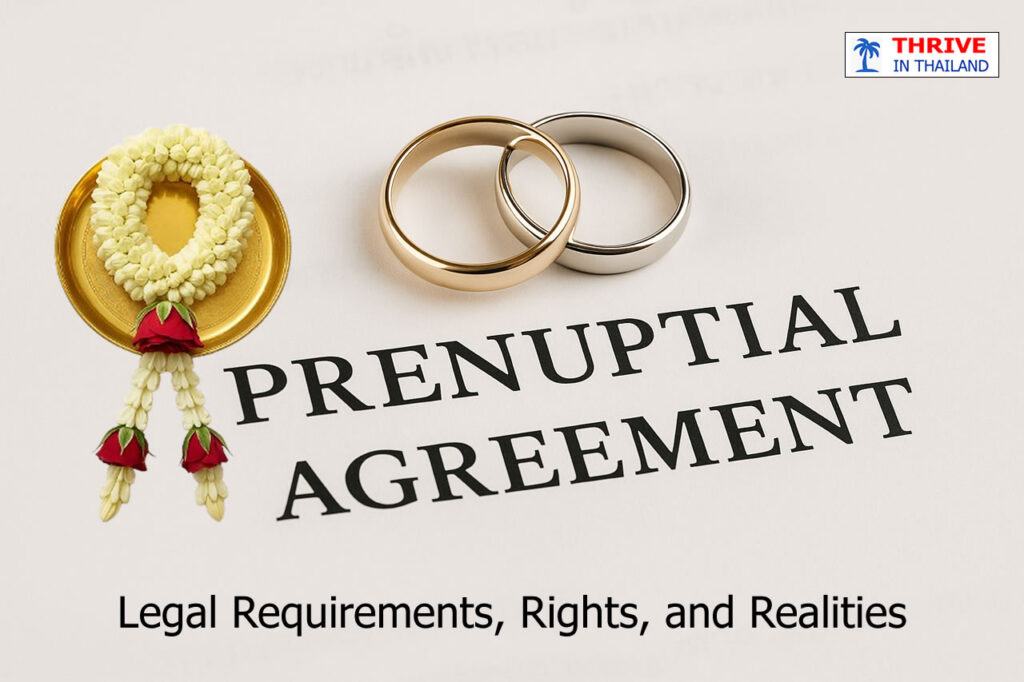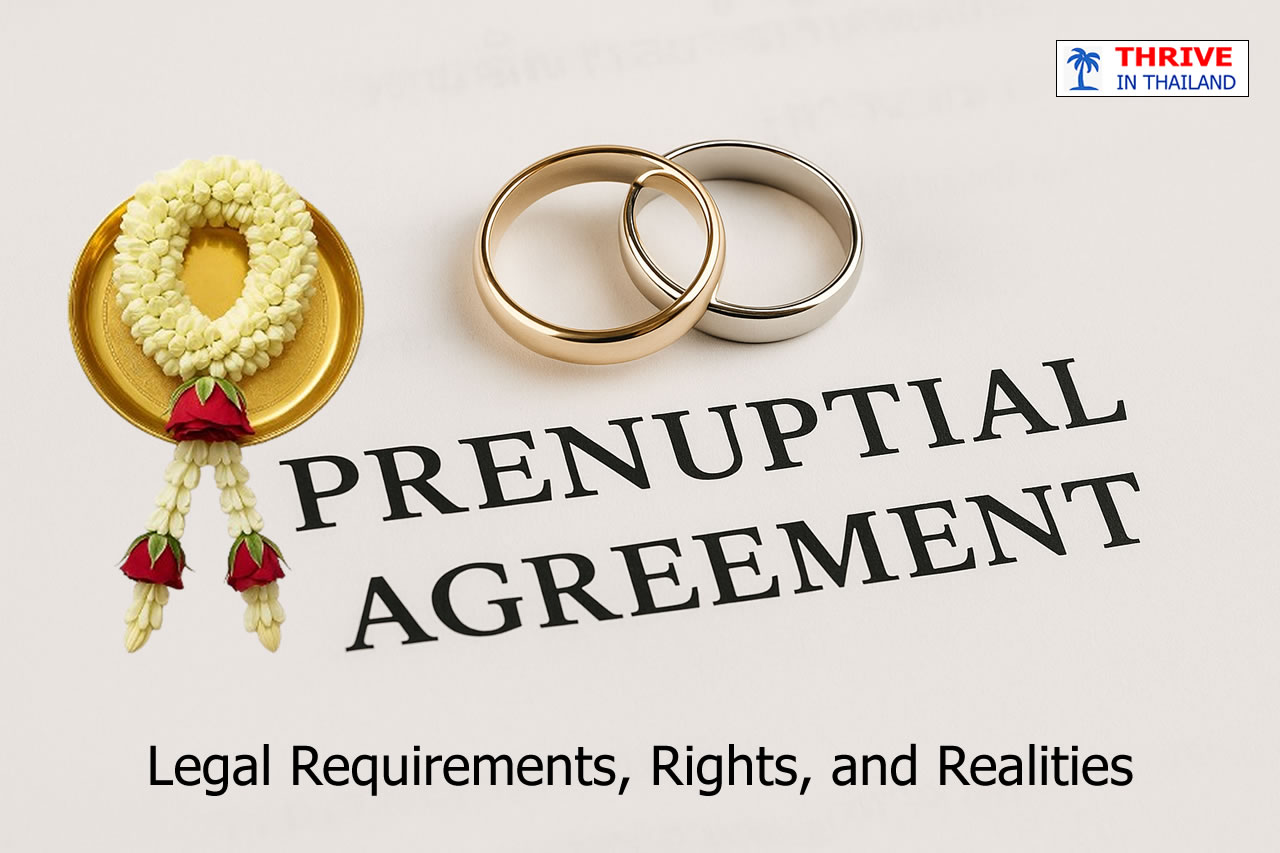
If you’re planning to get married in Thailand, it’s worth taking the time to understand how a prenuptial agreement works under Thai law. While it may not be the most talked-about aspect of marriage, a prenup can play an important role, especially for foreigners who may have assets or responsibilities in multiple countries.
Thailand has its own legal framework for marriage and property rights, and it’s not always the same as what expats are used to back home. Without a prenuptial agreement, Thai law applies by default, which can affect how assets are divided in case of divorce or death.
This article explains what a prenuptial agreement is, how it works in Thailand, and why it’s something many expats choose to have in place before registering their marriage.
What Is a Prenuptial Agreement in Thailand?
A prenuptial agreement, or sanya samphan samret kan dtaeng-ngan (สัญญาสมรสก่อนการแต่งงาน), is a legal contract made between two people before they register their marriage in Thailand. It outlines how property and financial matters will be handled during the marriage and in the event of a divorce.
Under Thai Civil and Commercial Code, Section 1465, a prenuptial agreement is only valid if:
- It is made in writing.
- It is signed by both parties.
- It is registered at the same time as the marriage at the local district office (amphur).
In Thailand, the purpose of a prenuptial agreement is to clearly define separate property (sin suan tua) and marital property (sin somros). This helps avoid confusion and disputes later on, particularly in mixed-nationality marriages where one partner may own property or assets outside of Thailand.
📌 It’s important to note that Thai prenuptial agreements cannot include clauses that are contrary to public order or good morals, and they must comply with Thai law to be enforceable.
Why Expats Should Consider a Thai Prenup
For many expats, a prenuptial agreement in Thailand isn’t just a formality; it’s a practical safeguard. Cross-cultural marriages often involve complex financial situations, including overseas assets, previous marriages, or differing legal systems. Without a prenuptial agreement in place, Thai marital property laws apply by default, and that might not reflect your personal wishes or expectations.
Here are a few key reasons why expats often choose to draft a Thai prenup:
Protection of Personal and Overseas Assets
Without a prenup, any property acquired during the marriage may be considered sin somros (joint marital property), even if it’s located outside Thailand. A prenup can help keep personal assets, such as a condo purchased before marriage or a retirement account overseas, clearly defined as separate property.
Clarity Around Debt Responsibility
A Thai prenuptial agreement can specify who is responsible for which debts. This is particularly useful if one partner enters the marriage with significant business or personal debt.
Legal Certainty in Case of Divorce
Divorces can be emotionally difficult, and the legal process can be even more complicated if no clear financial agreement exists. A prenup helps avoid misunderstandings by setting expectations in advance, minimizing disputes over property division.
Avoiding Inheritance Conflicts
In some cases, assets left behind after death can be contested by heirs from previous marriages or family members abroad. A properly structured prenup can clarify asset ownership and reduce the risk of such disputes.
Alignment with Thai Law
A Thai-registered prenuptial agreement is recognized by Thai courts. Relying solely on a foreign prenup or assumptions based on another country’s laws can lead to problems during legal proceedings in Thailand.
Legal Requirements for a Valid Prenup in Thailand
Thailand has specific legal rules for prenuptial agreements, and failing to follow them can render the agreement invalid. Unlike in some countries where a prenup can be signed privately and later enforced in court, Thailand requires that the agreement be properly registered at the time of marriage.
To be legally valid under Thai law, a prenuptial agreement must meet all of the following requirements:
1. Must Be in Writing
Verbal agreements or informal arrangements are not recognized. The prenup must be clearly written out as a formal legal document.
2. Signed by Both Parties
Both the bride and groom must sign the agreement before the marriage is officially registered. If either party signs after the registration, the agreement will not be legally binding.
3. Registered Together with the Marriage
The prenuptial agreement must be submitted to the local district office (amphur) at the same time the marriage is registered. This step is non-negotiable; if the agreement is submitted later, it will not be accepted.
4. Complies with Thai Law
The terms of the agreement must not violate Thai law or public morals. For example, clauses that attempt to limit child support, assign custody in advance, or involve unfair obligations may be rejected.
5. Independent Legal Advice (Strongly Recommended)
While not a legal requirement, it’s highly advisable that each party consult their own lawyer, especially in international marriages. A bilingual lawyer can ensure the agreement is fair, clearly translated, and enforceable in Thai courts.
📌 Thailand does not allow you to add, modify, or cancel the prenuptial agreement after the marriage has been registered. Once it’s filed with the district office, it becomes part of the official marriage record and cannot be changed retroactively.
What Can (and Can’t) Be Included in a Thai Prenup
A Thai prenuptial agreement can help define how assets and debts are managed within a marriage, but it’s not a free-for-all. There are clear limits to what the law allows.
✅ What Can Be Included:
Thai law permits couples to include clauses about property and financial arrangements, as long as they are lawful and reasonable. Common inclusions are:
- Separation of assets: Defining which property is sin suan tua (personal property) and will remain outside the marital estate.
- Management of joint property: Rules about how sin somros (marital property) will be handled or divided.
- Debt responsibility: Specifying which partner is responsible for pre-existing or future debts.
- Business ownership and shares: Clarifying who retains ownership in any business or partnership, including companies registered abroad.
- Property acquired before marriage: Protection of real estate or financial assets held prior to marriage registration.
❌ What Cannot Be Included:
Some things are strictly off-limits or unenforceable under Thai law:
- Child custody or child support clauses: These issues must be decided based on the child’s best interest at the time of separation and cannot be predetermined in a prenup.
- Personal obligations or restrictions: For example, clauses requiring one spouse to perform household duties or prohibiting remarriage are not recognized.
- Anything contrary to public order or morality: Unfair or coercive terms may be struck down by a Thai court.
- Terms violating Thai property laws for foreigners: You cannot use a prenup to sidestep laws prohibiting foreign land ownership in Thailand.
📌 Thai courts may strike out any individual clause that is invalid while still upholding the rest of the agreement, assuming the remainder is lawful and properly structured.
Common Mistakes & How to Avoid Them
Creating a prenuptial agreement in Thailand may seem straightforward, but there are common pitfalls, especially for foreign nationals unfamiliar with Thai legal procedures. Here are the key mistakes to avoid:
❌ Mistake #1: Signing Too Close to the Wedding Date
Why it matters:
If one party can later claim they signed under pressure or without proper time to consider, a Thai court may view the agreement as unfair.
How to avoid it:
Start the prenup process well in advance, ideally several weeks or even months before the marriage registration date.
❌ Mistake #2: Not Registering the Prenup at the Same Time as the Marriage
Why it matters:
Thai law requires that the prenup be submitted and recorded at the same time as the marriage. Forgetting this step renders the prenup invalid.
How to avoid it:
Bring the signed prenup with you to the district office (amphur) when you go to register your marriage. Confirm that it’s officially noted in the marriage record.
❌ Mistake #3: Relying on a Foreign Prenup Only
Why it matters:
Agreements made abroad may not be recognized in Thailand, even if valid in your home country.
How to avoid it:
If you’ve already made a prenup in another country, consult a Thai lawyer to draft a parallel agreement that complies with Thai law and register it locally.
❌ Mistake #4: Not Getting Legal Advice
Why it matters:
Thai legal language can be complex, and poorly translated documents may cause confusion or disputes later.
How to avoid it:
Hire a reputable Thai lawyer (preferably bilingual) to review or draft the prenup. If both parties come from different legal backgrounds, each should have independent legal counsel.
❌ Mistake #5: Including Unenforceable Clauses
Why it matters:
If the agreement contains terms that violate Thai law, those parts will be invalid, and it may weaken the rest of the agreement.
How to avoid it:
Stick to lawful financial and property arrangements. Leave out issues like child custody, personal conduct, or foreign land ownership.
Do You Need a Lawyer?
Technically, Thai law does not require you to hire a lawyer to draft a prenuptial agreement. However, for expats, and especially in cross-cultural marriages, it’s strongly recommended. A lawyer can help ensure that the agreement is both legally valid and fair to both parties.
Here’s why involving a qualified legal professional is a smart move:
✅ Bilingual Expertise
A Thai lawyer fluent in your language and Thai can ensure that both parties understand every clause. Misunderstandings due to poor translation can later lead to disputes—or worse, legal challenges.
✅ Knowledge of Thai and International Law
Expats often bring international elements into their marriage, overseas property, foreign income, or children from previous relationships. A lawyer experienced with cross-border legal issues can structure the prenup accordingly.
✅ Avoiding Unenforceable Clauses
Certain clauses may seem reasonable but are actually prohibited under Thai law. A lawyer will know what can (and can’t) be included to keep the agreement enforceable.
✅ Documentation and Proper Registration
Lawyers can guide you through the full registration process to ensure your prenup is accepted by the district office and properly attached to your marriage record.
📌 Each party should ideally have independent legal representation, especially if one partner is significantly wealthier or more experienced with legal matters.
Prenuptial vs Postnuptial Agreements in Thailand
In many countries, couples can create or revise financial agreements after marriage, but Thai law does not work that way.
In Thailand, only prenuptial agreements are legally recognized under the Civil and Commercial Code. There is no provision for registering a postnuptial agreement once a marriage is already on record.
Key Differences:
| Type of Agreement | Legally Recognized in Thailand? | When It Must Be Signed | Registration Requirement |
|---|---|---|---|
| Prenuptial | ✅ Yes | Before marriage | Must be registered with marriage |
| Postnuptial | ❌ No | After marriage | Not legally recognized |
⚠️ What This Means for Expats:
- If you get married in Thailand without a prenup, Thai marital property law (sin somros) will apply by default.
- You cannot add or modify a prenup after marriage. Attempting to create a financial agreement post-marriage will not hold up in Thai court.
- If you later divorce, the division of property will be based on Thai default rules unless a valid prenup is in place from the start.
📌 While informal agreements can still be made between spouses, they carry little weight in court without formal legal recognition.
What Happens Without a Prenup?
If you get married in Thailand without a prenuptial agreement, your financial and property matters will automatically be governed by Thai marital property law whether you intended it or not. This default framework is known as the community property system, and it can have significant consequences in the event of a divorce or death.
What Thai Law Says:
Under the Thai Civil and Commercial Code, all property is divided into two categories:
- Sin Suan Tua (Personal Property):
- Property owned before the marriage
- Gifts or inheritances received during the marriage
- Personal items used exclusively by one spouse (e.g., clothing, personal tools)
- Sin Somros (Marital Property):
- All property acquired during the marriage (unless proven otherwise)
- Income earned by either spouse during the marriage
- Property purchased together or improved using joint funds
📌 By default, sin somros is divided 50/50 in the event of divorce even if only one spouse earned the income or held legal title.
Real-Life Example:
A foreign husband buys a house in Thailand in his Thai wife’s name during the marriage. He pays for it in full, but there’s no prenup. Later, they divorce. Under Thai law, the house is presumed to be marital property, and he may only recover half its value despite having paid 100%.
📌 Without a prenup, you’ll have limited control over how your assets are classified and divided. For expats with international finances or significant pre-marriage assets, that lack of control can become costly.
Frequently Asked Questions
Still have questions? Here are a few additional points that often come up when expats consider prenuptial agreements in Thailand.
1. Can a prenuptial agreement be written in English?
Yes, but if you plan to register the prenup with a Thai district office, it must also include an official Thai version. Most law firms provide a bilingual document to ensure both parties understand the terms and to meet Thai legal requirements.
2. Will a Thai prenuptial agreement be recognized in my home country?
It depends on your home country’s laws. Some jurisdictions may recognize a Thai prenup if it meets their standards of fairness and legal procedure, but others may not. If you have assets or legal concerns abroad, it’s wise to consult a lawyer in both countries.
3. Can a Thai prenup cover future assets or income?
A prenup can specify how future property or income will be treated (e.g., whether it will become marital or remain personal). However, it cannot detail assets that don’t yet exist without clear reference and agreement on how to categorize them.
4. Is a prenup still valid if we move abroad after getting married in Thailand?
The Thai prenup remains valid under Thai law as long as it was correctly registered. Whether it holds legal weight in another country depends on local laws there. If you’re relocating, consider whether additional legal arrangements are needed in your new country.
5. Can a prenup be challenged or overturned in Thailand?
Yes, a prenuptial agreement can be challenged in court. Common grounds include claims of coercion, lack of understanding (e.g., language barrier), unfair terms, or failure to register the agreement properly. This is why legal advice and fair drafting are essential.
Further Reading & Related Guides
Exploring marriage in Thailand? These related guides will help you navigate the cultural, legal, and emotional landscape with confidence:
✅ Dowry (Sin Sod) in Thailand: Understanding the Tradition
Why dowries matter in Thai culture—and what every foreign partner should know.
🔗 https://thriveinthailand.com/thai-dowry-sin-sod-guide/
✅ Getting Married Legally in Thailand: Process & Requirements
Your step-by-step roadmap to getting legally married as a foreigner in Thailand.
🔗 https://thriveinthailand.com/getting-married-legally-in-thailand/
✅ Divorce & Custody in Thailand: A Guide for Foreigners
Understand what happens if things go south—how Thai law handles divorce and custody.
🔗 https://thriveinthailand.com/divorce-custody-thailand-guide-foreigners/
✅ Thailand Marriage Visa: Complete Guide
Learn how to apply for a long-term visa based on your Thai marriage, including eligibility and paperwork.
🔗 https://thriveinthailand.com/thailand-marriage-visa/
💬 Have a question or personal experience with prenups in Thailand? Feel free to share it in the comments below; I read every one.

